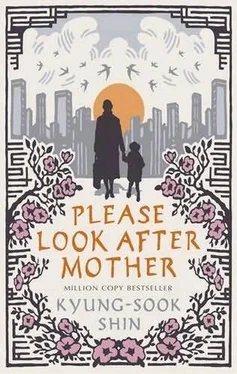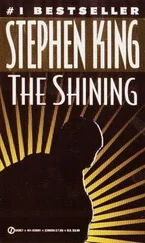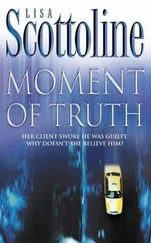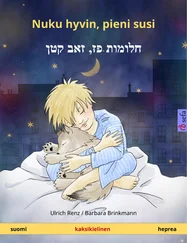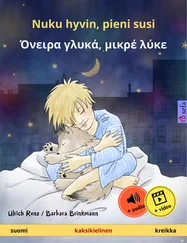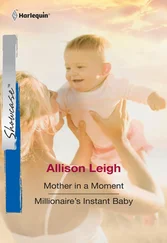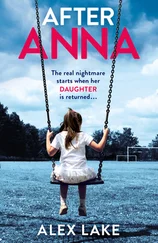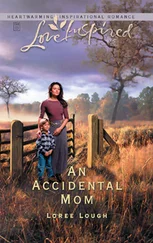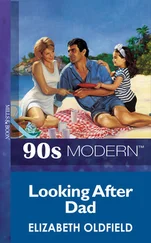Kyung-sook Shin - Please Look After Mom
Здесь есть возможность читать онлайн «Kyung-sook Shin - Please Look After Mom» весь текст электронной книги совершенно бесплатно (целиком полную версию без сокращений). В некоторых случаях можно слушать аудио, скачать через торрент в формате fb2 и присутствует краткое содержание. Жанр: Современная проза, на английском языке. Описание произведения, (предисловие) а так же отзывы посетителей доступны на портале библиотеки ЛибКат.
- Название:Please Look After Mom
- Автор:
- Жанр:
- Год:неизвестен
- ISBN:нет данных
- Рейтинг книги:4.5 / 5. Голосов: 2
-
Избранное:Добавить в избранное
- Отзывы:
-
Ваша оценка:
- 100
- 1
- 2
- 3
- 4
- 5
Please Look After Mom: краткое содержание, описание и аннотация
Предлагаем к чтению аннотацию, описание, краткое содержание или предисловие (зависит от того, что написал сам автор книги «Please Look After Mom»). Если вы не нашли необходимую информацию о книге — напишите в комментариях, мы постараемся отыскать её.
Told through the piercing voices and urgent perspectives of a daughter, son, husband, and mother, Please Look After Mom is at once an authentic picture of contemporary life in Korea and a universal story of family love.
You will never think of your mother the same way again after you read this book.
Please Look After Mom — читать онлайн бесплатно полную книгу (весь текст) целиком
Ниже представлен текст книги, разбитый по страницам. Система сохранения места последней прочитанной страницы, позволяет с удобством читать онлайн бесплатно книгу «Please Look After Mom», без необходимости каждый раз заново искать на чём Вы остановились. Поставьте закладку, и сможете в любой момент перейти на страницу, на которой закончили чтение.
Интервал:
Закладка:
“A mink coat, Mom?”
“Yes, a mink coat.”
She was quiet.
“Are you going to buy me one or not?”
“It’s not that cold this year. Do you have someplace to wear a mink coat to?”
“Yes.”
“Are you going somewhere?”
“No.”
She laughed out loud at my curt replies. “Come to Seoul, then. We can go shopping together.”
As we walked into the department store, to the mink coats, my daughter kept looking at me without saying anything. I had no idea that my mink coat, which was slightly shorter than the one I had buried my face in, the one that woman in church was wearing, was such an expensive thing. My daughter didn’t tell me. When we went home with the mink coat, my daughter-in-law’s eyes bulged. “A mink coat, Mother!”
I was quiet.
“You’re so lucky, Mother. To have a daughter who buys you expensive things like this. I haven’t even been able to buy my mother a fox scarf. They say a mink gets handed down for generations. When you pass away, you should leave it to me.”
“It’s the first time Mom ever asked me to buy something for her! Stop it!”
When my daughter shot back at her sister-in-law as if she was angry, I realized it. The reason she kept looking at the price tag, again and again. And the reason she kept looking at me. At that time, she had just graduated from college and was working at a hospital pharmacy. When I got back from Seoul, I took the mink coat and went to a similar store in town and asked the girl working in the mink-coat department how much it cost. I froze. Who knew one piece of clothing could cost so much! I called my daughter to tell her that we should return the coat, and she told me, “Mom, you have every right to wear that coat. You should wear it.”
In this region, there are very few cold days in winter, so I could wear a mink coat only occasionally. Once, I didn’t wear it for three years. When I had depressed thoughts, I opened the wardrobe and buried my face in the mink coat. And I thought, When I die, I will leave it to my younger daughter.
Although it’s frozen now, in the spring the flower garden near the wall will come alive again. The blossoms on the neighbor’s pear tree will bloom, and their scent will float over. The rose vines with pale-pink buds will flex their spikes, cheering. The weeds under the wall will grow thick and tall with the first spring rain. Once, I bought thirty ducklings from under the bridge in town and let them out in the yard, and they rushed over to the flower garden and stepped on all the flowers. When they ran around in packs with the chicks, it was hard to tell which were ducklings and which were chicks. Anyway, in the spring, the yard was noisy because of them. It was in this yard that my daughter, who was digging under the rosebush, saying that it would yield a lot of flowers if it was given manure, saw a wriggling worm in the dirt, threw the short hoe aside, and ran inside; the hoe hit a chick and killed it. I remember the wave of the smell of dirt that would reach my nose when, in the summer, a sudden rain fell, and the dog and chickens and ducks that had been wandering around the yard crawled under the porch and into the chicken cages and under the wall. I remember the droplets of dirt formed by the sudden rain. On windy late-fall nights, the leaves of the persimmon tree in the side yard would rustle off and fly around. All night, we would hear them scuttling across the yard. During snowy winter nights, the wind would blow the snow piled in the yard onto the porch.
Someone is opening the gate. Ah, Aunt!
You were an aunt to my children and a sister to me, but I was never able to call you “sister”: you seemed more like my mother-in-law. I see you have come to check on the house, because it’s snowing and windy. I thought nobody was here to look after this house, forgetting that you’re here. But why are you limping? You’re always so spry. I guess you’re getting old, too. Be careful-it’s snowy.
“Anyone home?”
Your voice is still powerful, like it’s always been.
“Nobody’s here, right?”
You are calling out even though you know nobody is here. You sit on the edge of the porch, not waiting for an answer. Why did you come without wearing enough layers? You’ll catch a cold. You’re looking at the snow in the yard as if you’re somewhere else. What are you thinking?
“It feels like someone’s here…”
Halfway to being a ghost, Aunt.
“I don’t know where you’re wandering around when it’s this cold.”
Are you talking about me?
“The summer went by, and fall went by, and it’s winter… I didn’t know you were such a heartless person. What is this house going to do without you? It’s just an empty shell. You left wearing summer clothes, and you haven’t come back even though it’s winter-are you already someone of the other world?”
Not yet. I’m wandering around like this.
“The saddest person in the world is the one who dies outside their home… Please be alert and come back home.”
Are you crying?
Your eyes, long slants, look up at the gray sky and become wet. Your eyes aren’t scary at all, now that you’re acting like this. I was always so frightened by your stern eyes that I honestly didn’t look at your face, so as not to meet your eyes. But I think I liked you better when you were no-nonsense. This doesn’t seem like you, sitting with your shoulders drooping. I was never able to hear anything nice from you when I was alive, so why do I have to look at your dejected figure now? I don’t like seeing you weak. I wasn’t only afraid of you. If something difficult happened and I didn’t know what to do, I thought, What would Aunt do? And I would choose what I thought you would do. So you were my role model, too. You know I have a temper. All the relationships in the world are two-way, not determined by one side. And now you’re going to have to look after Hyong-chol’s father, who’s all alone. I don’t feel good about it, either. But since you are near him, I feel a little better. When I was alive, I knew full well that you were depending on Hyong-chol’s father, since you were all alone, and I didn’t feel hurt or left out or disappointed. I just thought of you as a difficult elder of the family. So much so that you felt like our mother and not our sister. But, Aunt… I don’t want to go to the grave set aside for me a few years ago at the ancestral grave site. I don’t want to go there. When I lived here and woke up from the fog in my head, I would walk by myself to the grave site set aside for me, so that I could feel comfortable if I lived there after death. It was sunny, and I liked the pine tree that stood bent but tall, but remaining a member of this family even in death would be too much and too hard. To try to change my mind, I would sing and pull weeds, sitting there until the sun set, but nothing made me feel comfortable there. I lived with this family for over fifty years; please let me go now. Back then, when we were assigning grave sites and you said my plot should go on a site down the slope from yours, I glared and said, “Oh, so even when I’m dead I can do your errands.” I remember saying that. Don’t be upset about it, Aunt. I thought about it a long time, but I didn’t say that with ill will. I just want to go home. I’ll go rest there.
Oh, I see the shed door is open.
The wind is pounding at the shed door as if it would knock it down. There’s a thin layer of ice on the wooden platform that I liked to sit on. If someone sat there without seeing the ice, he would slip right off. Chi-hon used to read in this shed. Getting bitten by fleas. I knew that she crept in here with a book, in between the pigsty and the ash shed. I didn’t look for her. When Hyong-chol asked where she was, I said I didn’t know. Because I liked seeing her read. Because I didn’t want to disturb her. Straw was piled on the board covering the pigsty. Chickens would have taken over one side and would be laying and sitting on eggs. Nobody would find the child squeezed in there, on top of the straw pile, putting spit on her flea bites to soothe them, reading. How much fun must it have been for her to hide there, reading, hearing her brother opening doors, pushing into the kitchen, looking for her? And the chickens, how particular were they? Huddled over eggs on the straw pile on top of the pigsty, they would get annoyed at the sound of my daughter turning pages. These chickens, who didn’t lay eggs if we didn’t make their nests cozy and tempting with nest eggs, became sensitive to Chi-hon’s rustling, and one time they cackled so much that her brother found her. What did she read, hidden quietly in the shed, with a pig grunting next to her and the chickens clucking above her and the hoe and rake and shovel and all kinds of farm equipment and straw around her?
Читать дальшеИнтервал:
Закладка:
Похожие книги на «Please Look After Mom»
Представляем Вашему вниманию похожие книги на «Please Look After Mom» списком для выбора. Мы отобрали схожую по названию и смыслу литературу в надежде предоставить читателям больше вариантов отыскать новые, интересные, ещё непрочитанные произведения.
Обсуждение, отзывы о книге «Please Look After Mom» и просто собственные мнения читателей. Оставьте ваши комментарии, напишите, что Вы думаете о произведении, его смысле или главных героях. Укажите что конкретно понравилось, а что нет, и почему Вы так считаете.
